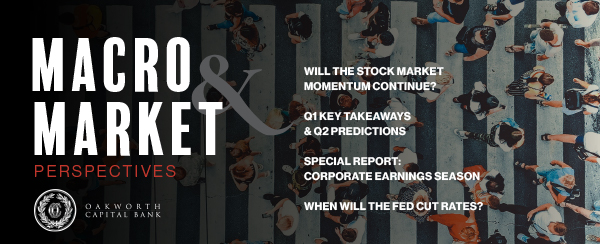- The Fed will delay cutting the overnight lending target rate for as long as the economy allows. At the earliest, the Fed will make its first move to cut rates in June. However, the July FOMC is looking increasingly more likely.
- After consecutive strong quarters, the stock market will take a breather during the 2nd quarter. As defined by the forward price-to-earnings (P/E) ratio and the S&P 500, large cap domestic stocks look as “fully valued” as they have in the past two years. Earnings must either pick up significantly or the Fed will have to cut the overnight rate more aggressively for the “good times” to continue on as they have been.
- The labor markets will finally show some visible signs of softening. Analysts have been scratching their heads for the past couple of months over conflicting data. During the 2nd quarter, the official unemployment rate could increase above 4% for the first time in two years.
- The situation in Gaza will continue to polarize the American public while it galvanizes Israel. By the end of the conflict, the historically strong ties between the United States and Israel could be permanently impaired.
- The disconnect between the official economic data and how the public feels about the economy will continue. While the headline numbers have been robust, American consumers are still facing significantly higher pricing for a lot of goods and services, particularly food and housing.
- Controversy over the EPA’s tailpipe emission mandates in March will boil over into the 2nd quarter. The debate is likely to shift toward recognizing that what works well in densely populated areas may not be as practical and efficient in rural ones. As with a lot of issues in the country, this one will quickly devolve into the two coasts versus everyone in the middle.
- If Congress doesn’t approve additional funding for Ukraine by the end of the 2nd quarter, it will be hard to envision it approving anything prior to the general election. If this happens, Kiev will have a difficult time continuing to defend its country and might be forced to eventually come to the proverbial table with Moscow.
- We will eventually find out the reason for all the recent secrecy from the royal family. Since Americans seem to prefer airing their dirty laundry in public, we won’t ever really understand what all the fuss is about.
- The sheer deluge of Treasury debt issuance, coupled with stickier-than-expected consumer prices, will keep upward pressure on longer-term interest rates. At some point in 2024, the Federal Reserve will have to pause its “quantitative tightening” program to keep the yield to maturity on the 10-Year Treasury from increasing too much.
- The proposed Tik-Tok ban has the potential to further alienate America’s largest geopolitical adversary while potentially violating the First Amendment. At some point, the public will have to wrestle with the question: is deterring China worth infringing on my Constitutional rights?
- The combination of higher interest rates and troublesome commercial real estate loans will force many underperforming banks to look for potential suitors. Ultimately, the outcome will be that a number of mediocre, small- to mid-size firms will join forces to cut expenses and grow.
- Ongoing drought conditions in the Midwest, leading to persistently higher beef and grain prices, are continuing to put the squeeze on fast food franchisees. Further complicating their problems is the persistent inability to find capable people willing to work for reasonable pay. As a result, many national chains will shutter stores and some regional ones could close for good.
- If a Trump victory in November becomes readily apparent, there will likely be an even greater surge in illegal migration in the weeks and months leading up to the year’s end. It has the potential to make the problems our border patrol has had over the last several years look like a walk in the park.
This content is part of our quarterly outlook and overview. For more of our view on this quarter’s economic overview, inflation, bonds, equities and allocation read our most recent issue of Macro & Market Perspectives.
The opinions expressed within this report are those of the Investment Committee as of the date published. They are subject to change without notice, and do not necessarily reflect the views of Oakworth Capital Bank, its directors, shareholders or employees.




